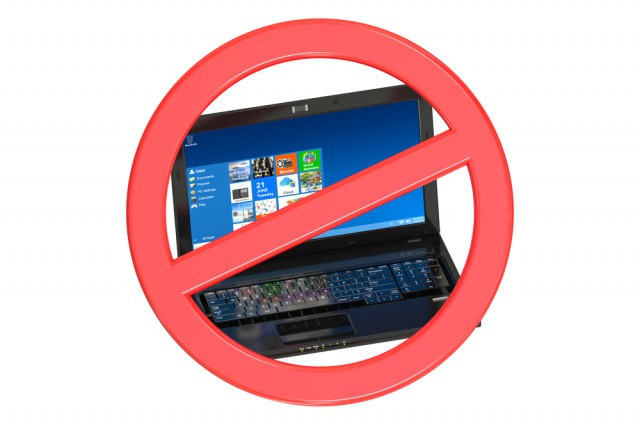
UK businesses less prepared for GDPR than European counterparts
The new GDPR legislation is now just a year away from coming in to force, but new research claims that British businesses are not nearly as prepared as expected.
A study by Blancco Technology Group reveals that the UK is significantly less prepared than its European counterparts, with companies lagging behind the rest of the continent.

Europe approves rules that would force Facebook and other social sites to tackle hate-speech
Facebook may be taking steps to tackle hate speech and other unsavory content but the European Union could soon force it to do more. Plans have been approved for rules that require online content providers such as Facebook, YouTube and Twitter to "protect children and tackle hate speech better."
Failure to comply with the rules could result in hefty fines being levied against offenders. There are still a number of hoops for the proposed regulations to pass through -- including the European Parliament -- before they become law, but it may not be long until social media sites are obliged to block hate speech videos and those that promote terrorism.

CISO salaries topping €1 million in Europe
Now might be a good time to consider that job as a chief information security officer you always wanted, because salaries are skyrocketing.
Thanks to an ever-increasing number in breaches, and the damage these breaches are causing, businesses in Europe have begun offering much better salaries to their CISOs.

More businesses are becoming familiar with GDPR, but fines are still likely
Even though the GDPR is just a year from coming into force, the majority of businesses are still unprepared. This is according to new research from Compuware, which says businesses are risking huge non-compliance fines.
Some businesses, truth be told, have made progress since last year.

Many senior executives do not know GDPR is coming
More than four fifths (84 percent) of small business owners in the UK, and almost half (43 percent) of senior executives in large companies have no idea what GDPR is and that it’s coming.
That's according to Shred-it’s Security Tracker research, which also found that roughly one in seven (14 percent) of small business owners, and 31 percent of senior executives know what the fines of not complying with the GDPR are.

Facebook hit with massive fine for providing misleading information about WhatsApp takeover
The European Commission has hit Facebook with a €110 million ($122 million) fine for "providing misleading information about WhatsApp takeover". The Commission previously expressed concern that the social media giant had not correctly communicated planned changes to its privacy policy.
The changes meant that Facebook was able to match data gathered from WhatsApp users to their Facebook account, even though the company said this was not the case. The "proportionate and deterrent fine on Facebook" is designed not only to punish Facebook, but also to send a message to other companies involved in mergers and acquisitions.

US considers laptop ban on European flights
The Trump administration is considering a further expansion of the ban on using laptops on commercial flights to cover European travel.
According to Reuters , the US government is reviewing how to make sure lithium batteries that get stored in the luggage don’t explode during flights.

One in four European businesses don't know GDPR is coming
Every fourth European company has no idea GDPR is coming its way. Consequently, they don’t know about the dangers and the draconic fines that follow those that don’t comply with the upcoming regulation.
This is according to a new report by IDC Research, based on a poll of 700 European companies. More than half (52 percent) don’t know what the impact on their organization is.

Mozilla's Paperstorm campaign calls for copyright reform to save the internet
Mozilla has teamed up with design studio Moniker and launched a new "digital advocacy tool" called Paperstorm with the aim of modernizing copyright laws in Europe. The tool makes it easy for ordinary internet users to carpet bomb European lawmakers with virtual leaflets demanding change.
The campaign is looking to drop millions of leaflets on cities around Europe to send a message to EU policymakers. The timing is important because copyright laws are due to undergo amendments, and proposals need to be in by the end of the year. Mozilla says that existing rules are outdated, and now is the time to make sure the laws are appropriate to modern needs.

Galileo atomic clocks failed: What can we learn from it?
Galileo has been making headlines once again, and this time not for the right reasons. It was reported on January 18, 2017 that several of the atomic clocks responsible for the satellites’ ability to calculate precise time have failed.
Timing is everything in GNSS -- very precise time is required to calculate an accurate value of the delay in receiving signals that have been transmitted from a given satellite. This allows users to determine their position on Earth accurately. Also, many applications today take advantage of the very precise timing that GNSS can provide via the atomic clocks in use on the satellites.

Outdated practices and tech affect employee morale
It’s no surprise to anyone that the UK is in the grips of a legacy technology crisis. But, in an age of digital innovation it’s not acceptable that so many organizations are still running on technology that should have been left behind over a decade ago.
The golden rule with technology in any organization is to not lag too far behind. Equipment that is old, breaks down or slows work activity will have significant effects on the motivation levels of employees, and it’s already giving way to a negativity epidemic in UK offices.

Many UK businesses cancelled GDPR preparations due to Brexit
Here's a facepalm moment for you this morning -- a quarter of UK businesses stopped preparing for the GDPR thinking the regulation won't apply once the UK leaves the EU.
The GDPR, or General Data Protection Regulation, has been ratified by the UK and will come into force on May 2018 -- which will almost certainly be before the UK leaves the EU.

European information security execs face major challenge from insider threats
New research shows that 35 percent of employees across the UK, France, Germany and Italy admit to have been involved in a security breach.
This presents CISOs with a significant challenge when it comes to protecting company data, particularly in light of the forthcoming European General Data Protection Regulation (GDPR) which comes into effect in early 2018.

Facebook, Google and Twitter could face EU legal action for unfair terms and conditions, and failing to tackle scams
Having expressed concerned about privacy in Windows 10 and the scanning of Yahoo emails, the European Commission is now turning its attention to Facebook, Google+ and Twitter. The commission is concerned about a rising number of complaints from people who have fallen victim to scams on social media, and being subjected to terms and conditions that are incompatible with European law.
Having already written to the three companies back in November, the European Commission, along with EU consumer authorities, met to discuss how they will move forward. The commission says that if the proposals are unsatisfactory, "enforcement action" may be required.

How strong endpoint security can prevent cyberattacks
Businesses with dispersed and on-the-move employees are struggling to strike a difficult balance between the benefits of remote working and the security risks it creates. Security software designed to protect data at risk is nullified if it can be removed. To achieve their own stringent security aims while satisfying the demands of increasingly tight and punitive regulation, companies need a more persistent security solution.
Many organizations consider it to be only a matter of time before they fall victim to a cyberattack. PwC's 2016 Economic Crime Survey revealed that over half of responding UK organizations consider it likely they’ll suffer from cybercrime in the next two years. The prevalence of cybercrime makes detection and response capabilities critical in business today.
